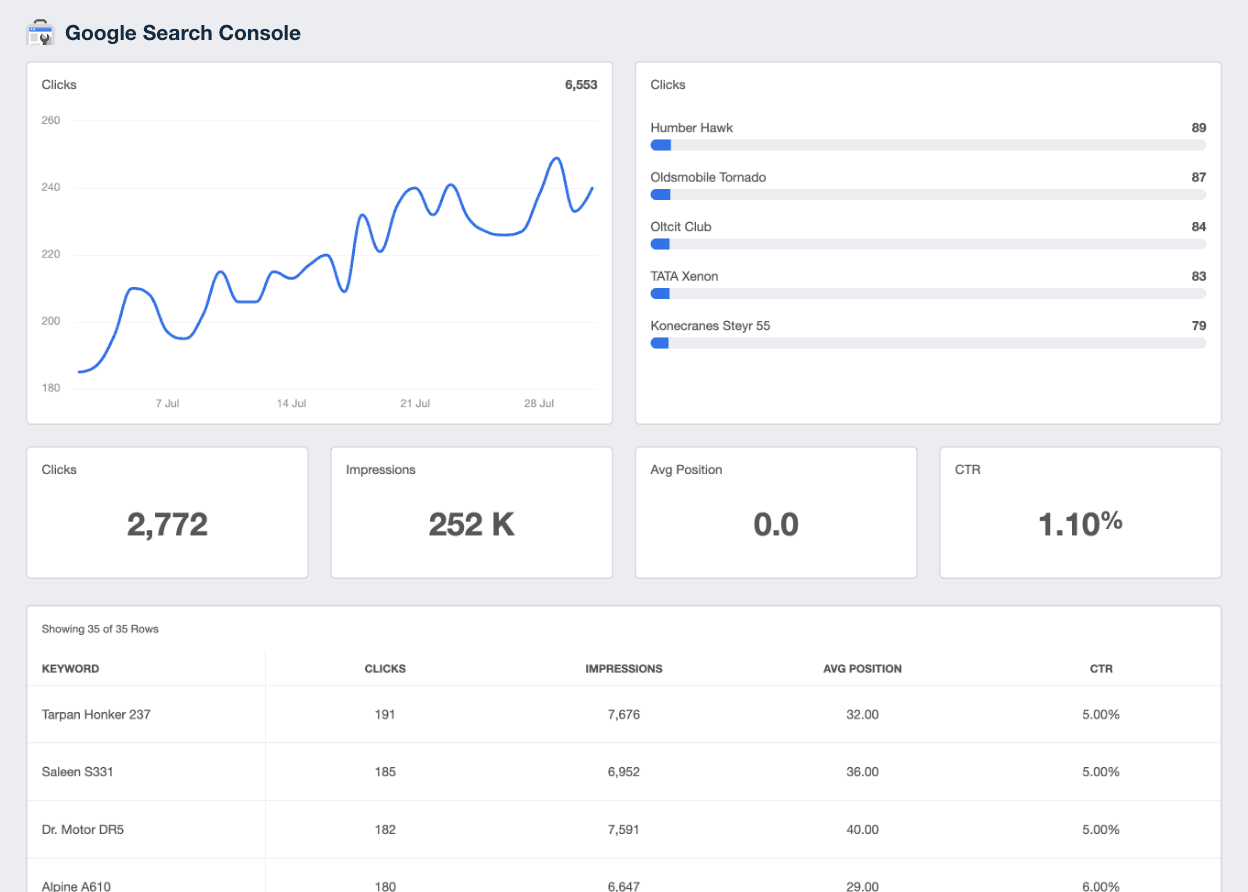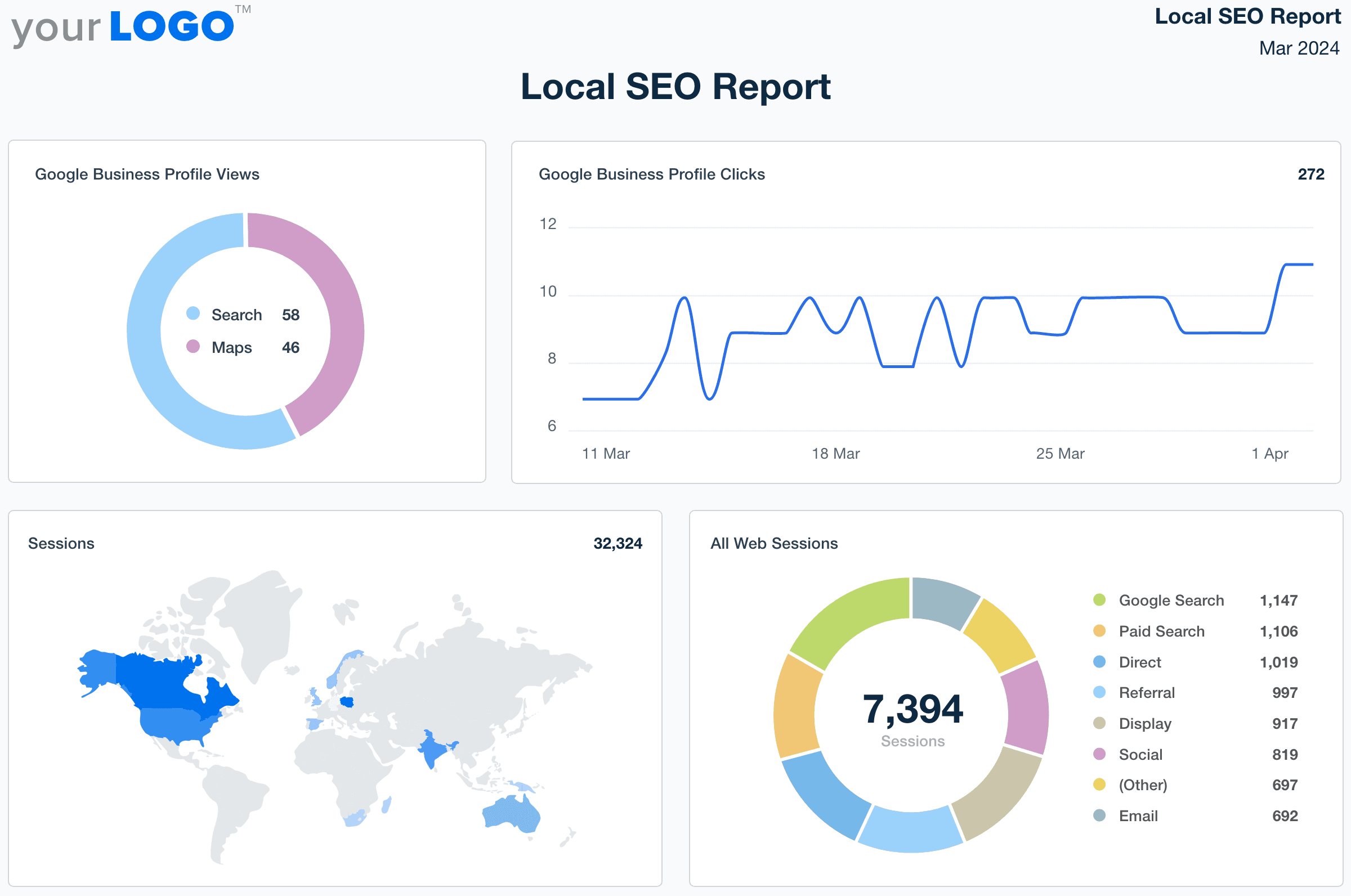Table of Contents
Table of Contents
- What Is Voice Search Optimization?
- Voice Search Optimization Strategy vs. Text Search Optimization Strategy
- Why Voice Search Optimization Still Matters in 2024
- 10 Benefits of Voice Search Optimization
- 6 Tips To Optimize Client Websites for Voice Search
- Boost Client Visibility With Voice Search Optimization
7,000+ agencies have ditched manual reports. You can too.
Free 14-Day TrialQUICK SUMMARY:
Voice search optimization is becoming increasingly important for businesses as more people use voice-activated devices like smartphones and smart speakers to search for information. Marketing agencies that help clients optimize for voice search will boost visibility, particularly in local searches, and enhance user engagement. By incorporating conversational keywords and improving technical SEO, agencies ensure their clients rank higher in voice search results, providing a competitive edge in a rapidly growing market.
If you’ve been focused on traditional search engine optimization (SEO) strategies, now is the time to think beyond text.
Voice search optimization (VSO) is quickly becoming integral for businesses to reach customers where they are—through smart, voice-activated devices.
While voice search has been around since 2011, the technology has seen a surge in popularity over the last few years, with voice assistants embedded in smartphones, smart speakers, and even cars.
27% of Google searches are currently conducted by voice, totalling 1 billion voice searches globally per month.
By helping your clients adapt to this growing trend, your agency will unlock new opportunities and connect them with a market segment that prefers voice search, making their offerings more accessible and their businesses easier to find.
Read on to learn about the benefits of voice search optimization and show you how to help your clients make sure they're showing up in voice search results.
What Is Voice Search Optimization?
"Hey Siri, what’s the weather forecast for this weekend?"
Chances are, you've asked something similar to your digital assistant, whether it’s Google Assistant, Apple’s Siri, or Amazon’s Alexa.
NPR and Edison Research report that 62% of Americans now use voice assistants across multiple devices.
While many rely on them for everyday tasks like setting alarms or playing music, digital assistants are also used to conduct voice searches.
This is where voice search optimization strategy comes in.
You already understand the importance of optimizing written content so that it aligns with user search intent and is more likely to show up on search engine results pages (SERP).
Now that more people are using voice search capabilities to get answers to their most pressing questions, showing up in these search results is only becoming more important.
Voice Search Optimization Strategy vs. Text Search Optimization Strategy
Traditional SEO involves understanding search intent and designing content that best provides people with the answers they’re looking for.
Traditional search queries typed into a search engine tend to be written in shorthand, focusing mainly on keywords. For example, “coffee shop brooklyn.”
Voice searches tend to consist of more conversational queries that are closer to the way people actually speak. For instance, someone driving might say, "Hey Google, where’s the nearest coffee shop that’s open right now?"
The following table demonstrates some of the key differences between voice search and text search:
Voice Search vs. Text Search | ||
|---|---|---|
| Voice Search Query | Text Search Query |
Query Structure | Longer, conversational, typically incorporates long tail keywords, complete sentences or questions | Relies on short, keyword-focused phrases to find search results |
Response Format | Delivers one top result, prioritizing the highest-ranking answer | Presents multiple options, allowing users to browse and choose |
User Intent and Expectations | Intent is clear, often seeking quick and precise answers | Intent can be broader, giving room for exploration of content |
Device and Location | Commonly used on mobile devices or smart speakers, with location-aware responses | Used on both mobile and desktop, with less emphasis on location-based results |
When Windows launched their voice assistant, Cortana, they noticed an interesting pattern: while text searches typically averaged two words, voice searches were longer, often three words or more.
This might be because voice searches tend to be broader and more detailed.
For instance, instead of typing “sneaker prices,” someone might ask, “What are the best sneakers on a budget?” when using voice search.
We talk to our voice assistants as if we’re talking to real people.
Voice search queries are usually more conversational, longer, and formulated as full sentences or questions compared to queries typed into a traditional search engine. This slight difference requires a different approach to voice search optimization.
We’ll go into more detail about this below, including benefits and a few best practices for voice search optimization.
But first—why should you care?
Let's explore why we're still discussing voice search technologies that have been around since the early 2010s, and why voice search optimization could be the key to your clients’ success.

Keep track of how voice search optimization strategies are paying off within a custom Google Search Console dashboard. Create one in just 11 seconds with AgencyAnalytics–try it free for 14 days!
Why Voice Search Optimization Still Matters in 2024
Digital voice assistants are a mainstay of modern life, and their presence is only growing. By the end of this year, Statista predicts the number of digital voice assistants will reach a staggering 8.4 billion units, surpassing the world’s population.
Initially handling simple tasks, they now manage everything from answering voice queries to controlling smart homes, and even assisting with banking and healthcare services.
With virtual assistants becoming smarter and more versatile, businesses have an opportunity to reach users where they are: through voice-enabled devices.
As technology evolves, so should your clients’ marketing strategies. To stay competitive, your clients need to give customers what they want—a seamless, voice-enabled experience across various devices.
Impress clients and save hours with custom, automated reporting.
Join 7,000+ agencies that create reports in under 30 minutes per client using AgencyAnalytics. Get started for free. No credit card required.
Already have an account?
Log in10 Benefits of Voice Search Optimization
Voice search optimization offers advantages that significantly enhance your clients' online presence and engagement. Here are some key benefits to keep in mind:
1. Increase Visibility in Voice Searches
Voice search optimization boosts brand awareness, especially at the local level, as voice assistants share your client’s information in search results more frequently.
2. Build Trust With the Audience
By providing helpful and valuable information through voice search results, your client positions their business as an authoritative and trustworthy source, fostering deeper connections with potential customers.
3. Enhance User Experience
Voice search optimization often involves improving technical SEO elements, which leads to a better overall user experience on your client’s website.
Technical SEO issues such as website speed, crawlability, or indexing problems can delay progress. We conduct comprehensive audits and prioritize technical optimizations early in the campaign. Quick fixes and ongoing monitoring ensure that technical hurdles don't impede revenue generation.
Omar Muñoz, Co-Founder, REInvestor SEO
4. Increase Accessibility
Voice search allows users with various limitations or preferences to interact with content through voice commands, removing barriers and creating equal access to information.
By optimizing your clients' websites for voice searches, you’ll boost customer satisfaction and loyalty.
5. Convenience for Voice Search Users
Voice search presents a new way for users to retrieve information while engaged in daily tasks, like cooking or driving.
This hands-free approach complements the growing trend of wearable technology, allowing users to access services and data on the go.
6. Enhanced Local Visibility With Relevant Keywords
Incorporating local keywords such as “near me” or “in [your city]” makes it easier for voice search algorithms to identify a local business as a relevant voice search result.
Accurate representation across search engine listings and local directories improves the chances of appearing in local search results.
7. Prime Positioning in Search Results
Securing the featured snippet or top search results for voice search queries boosts content authority and trustworthiness, leading to increased click-through rates.
Users often select the first search results provided by their voice assistants, ensuring your clients' content remains accessible and top-of-mind.
8. Natural Language Engagement
Adopting a conversational tone in your client’s content reflects how users interact with smart speakers and voice-activated assistants like Siri, Alexa, and Google Assistant.
By mirroring natural speech patterns, content resonates more with users, encouraging them to stay on your client’s site longer and engage more deeply with the brand.
9. Gain Valuable Insights Into Customer Behavior
Voice search gives your clients the chance to understand how their customers interact with their business. By analyzing voice search trends, you’ll gather insights that shape your digital marketing strategy to better meet client needs.
10. Stay Ahead of the Competition
By optimizing for voice search, your clients differentiate themselves in a crowded marketplace. As more businesses begin to recognize the importance of voice search, being an early adopter will position them as leaders in their industry, attracting new customers and retaining existing ones.
6 Tips To Optimize Client Websites for Voice Search
To maximize your clients’ chances of ranking for voice search queries, you’ll want to implement strategies that also boost their overall SEO strategy. From improving website loading speed to targeting voice search keywords and ensuring mobile compatibility, here are some of our top tips to optimize your clients’ websites for voice search:
1. Understand the Audience's Preferred Digital Assistants
Different users favor different voice assistants. For instance, Google Assistant leads with over 85 million users in the U.S., followed closely by Siri and Alexa. Knowing which digital voice assistant dominates among your clients’ target audience will help you tailor their content accordingly.
For local searches, keep in mind:
Google Assistant uses Google Maps.
Siri relies on Apple Maps and Yelp.
Alexa works with Microsoft Bing.
Adjust your strategy based on the assistant you are targeting, such as optimizing Google Business Profile for Google Assistant users or enhancing Yelp reviews for Alexa users.
2. Revamp Your Clients’ Keyword Strategy
Traditional keyword strategies focus on how people input their queries into search engines, often relying on a string of keywords that may not always form coherent phrases but can still be interpreted by search engines. In contrast, an effective voice SEO strategy emphasizes relevant conversational keywords and phrases that users are more inclined to speak rather than type.
Here are some ways to tweak your clients’ content to optimize for voice search:
Write in a Conversational Style
Voice search SEO requires a focus on natural language and long-tail keywords, and creating content that reflects how people actually speak. For example, instead of targeting "Italian restaurant NYC," use "the best Italian restaurant near me."
Use Schema Markup
Schema markup, sometimes referred to as structured data, is code that helps search engines better understand online content. Implementing schema markup helps search engines grasp the context and intent behind your clients’ content, increasing the likelihood of being featured in voice search results. This improved understanding helps your clients show up for more relevant search queries–which translates to more traffic.
Schema markup enhances the appearance of web pages in traditional search engine results, making people more likely to notice and click on a page. All these things improve SEO strategy and overall site performance.
Add an FAQ Page
Encourage your clients to add an FAQ page that addresses common questions relevant to their target audience. This not only directly answers user search queries but also adds immediate value for their audience.
3. Conduct a Voice Search-Focused Content Audit
You’ve probably done a content audit for clients in the past, but this time, you’ll be looking at their content through the lens of voice search optimization.
Leverage tools like Google Analytics to pinpoint high-performing content and Google Search Console (GSC) for insights on secured featured snippets, clicks, impressions, and click-through rates (CTRs).
Evaluate articles, videos, and blog posts according to specific performance metrics. The aim is to determine what’s effective, what isn’t, and what can be improved to better align with their business goals and audience needs.
Identify high-performing content as well as content gaps. Fill these gaps by creating new content that directly addresses the questions their audience is asking.
Regularly auditing your clients’ existing content is an important part of your strategy to enhance their voice search visibility.
4. Implement Local SEO Best Practices
Local SEO tends to be more time-sensitive compared to organic SEO.
When people are searching locally, they’re usually looking for something they need right now, like a nearby coffee shop for a quick caffeine boost or a corner store for the milk they forgot to pick up at the grocery store.
When people need a quick solution, voice search offers a convenient way to find it.
Whether they're driving, commuting, or just strolling through their neighborhood, people are more likely to stop by or call a local business they find through voice search.
To capture the attention of this growing market, your clients need to optimize their online presence for local voice search queries. Encourage your clients to prioritize local search SEO with these simple tips to enhance their search engine visibility:
Optimize Their Google Business Profile
Make sure their profile is complete and up-to-date. This increases their chances of showing up for local voice queries.
Use Local Keywords
Get clients thinking about relevant keywords people might use to find local businesses, like “best coffee shop near me,” that can be incorporated throughout their content.
Keep Their NAP Information Consistent
Their business name, address, and phone number should match across all online platforms. This builds trust and helps search engines connect local businesses with people searching for them.
SEO Audits and Analytics
Uncover new sources of traffic and revenue by analyzing the long tail keywords your clients are already ranking for in search results.
Monitor exactly which pages are getting the most clicks and impressions and which could be further optimized for better results.
Impress your clients with actionable business insights, drawn from clear and easy-to-understand organic search data, while effortlessly creating and sharing reports.

Track Local SEO success by monitoring key metrics 24/7. Create a custom local SEO dashboard with AgencyAnalytics–sign up for your free 14-day trial.
5. Enhance Technical SEO Strategy
Voice search relies heavily on delivering quick and relevant answers to audience queries.
To optimize for this, your clients’ websites should follow technical SEO best practices, making it easy for digital voice assistants to understand what their website content is about and who it is relevant for.
Addressing issues related to speed, responsiveness or security makes sure that your clients’ sites rise to the top of voice search results, helping them connect with users who rely on voice-driven queries.
To improve your client’s website performance for voice search, try these helpful tips:
Optimize Site Structure: Adjust website structure to make it easy for search engines to crawl and index.
Improve Loading Times: Voice search favors fast-loading pages. Tools like Google PageSpeed Insights help monitor and improve website performance to increase the chance of showing up in voice search results.
Implement Mobile-Friendly Design: Since many voice searches are done via mobile devices, a responsive design ensures that a site displays correctly and loads quickly on various screen sizes and devices.

6. Prioritize Mobile Optimization
As mentioned above, having a mobile-friendly website is critical. Google mainly uses the mobile version of websites to index content, so it’s important that your clients’ sites are smartphone-friendly.
With mobile devices accounting for a significant portion of web traffic—76% of shoppers now use their mobile phones to make online purchases—it's clear that businesses need to prioritize mobile optimization to remain competitive.
Mobile optimization involves refining a website's design, structure, and content to deliver a seamless experience for users on their mobile phones. Here’s how to deliver this for your clients:
Create a Responsive Design: Make sure their website adjusts automatically to fit any screen size, providing a consistent experience across all mobile devices.
Improve Load Times: Optimize images, minimize code, and streamline navigation to enhance page speed. Fast-loading sites keep users engaged and are preferred by search engines.
Enhance Readability: Text should be legible without zooming. Use legible font sizes and aim for high contrast between text and background for better visibility.
Optimize Clickable Areas: Clickable areas should be well-spaced for ease of use. Adding more space between buttons and links prevents accidental clicks, making it easier for users to navigate your client’s site.
Naturally how your content appears on mobile device is arguably the most important consideration when it comes to accessibility.
Carlos A. Espitia, Managing Director, CAE Marketing & Consulting, Inc.
Boost Client Visibility With Voice Search Optimization
There's no question that the voice search revolution is here, and it's reshaping how people find information. To deliver the best results for your clients, optimizing their websites for voice search is essential.
As voice assistants become a fixture of daily life, aligning your clients' content with voice search SEO offers a number of advantages: increased visibility, improved user experience, and deeper connections with potential customers.
We understand that a website is often the first point of contact between a business and its potential customers, which is why we prioritize good design and user experience. Our web design services are tailored to meet the unique needs of each client, ensuring that their website not only looks great but also functions optimally and engages visitors.
Adam Binder, Founder + CEO, Creative Click Media
By incorporating long-tail keywords, optimizing Google Business Profiles, and refining technical SEO, you enhance your clients' chances of ranking higher in search results.
Adding voice search SEO to your services not only sets you apart from competitors but also gives your clients a competitive edge.
AgencyAnalytics SEO reporting tools provide real-time updates on backlinks, keyword rankings, website analytics, SEO site health, and more in a comprehensive and customizable SEO dashboard.
See why over 7,000 agencies use AgencyAnalytics to build fully-branded automated reports in minutes. Start your free 14-day trial today.

Written by
Anya Leibovitch is a B2B SaaS content marketing specialist. She partners with tech companies to design and execute their content marketing strategy. A writer first and foremost, she harnesses the power of storytelling to build and strengthen relationships between companies and the clients they serve.
Read more posts by Anya LeibovitchSee how 7,000+ marketing agencies help clients win
Free 14-day trial. No credit card required.






